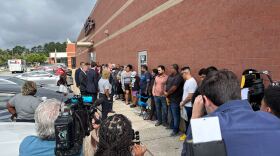For many teenagers, one of the most anticipated rites of passage is getting a driver’s license. Many of us can remember counting down the days until we turned 16, envying our classmates who had earlier birthdays and who could get behind the wheel sooner.
But several recent studies have found that a growing number of teenagers are passing up the opportunity to drive. The percentage of teens with licenses is steadily falling.
UNC sophomore Crystal Johnson is anxiously waiting for the bus. She’s done that nearly every day for the last two years, so she’s pretty familiar with the routine. It’s crowded at the stop on Columbia Street, so she’s a bit worried about getting a seat, especially because the bus is already 10 minutes late.
"It's irritating," Johnson says.
"When getting around by walking or by bus is your only option for transportation, it's irritating when the bus is late."
But as annoyed as she is, she doesn’t have much of a choice. Johnson doesn’t have a driver’s license, so she needs to rely on the bus to get around. One finally approaches the stop.
"That's still not the bus we need. That's the 'G.'"
She sighs. "Oh, my goodness."
Johnson, who is 19 years old, is just one of the many young adults who are putting off getting their drivers licenses. A University of Michigan survey showed that the number of licensed drivers aged 16 to 18 has decreased by at least 15 percent in the last 30 years.
Johnson says she doesn’t have a license because she can’t afford insurance. Even if she could, she doesn’t see the point while at college.
"Right now, as a sophomore in college, it's just not practical for me to have a car," she says.
"I can't have one up here, I don't have the money for a parking space, and even when I'm at home I have people that can drive me around."
Experts say money is one of the biggest reasons for the shrinking number of young drivers. Another reason could be that more young people are moving to cities with mass transit, making cars less necessary.
“I think times have changed," says Arthur Goodwin, who studies young drivers at the UNC Highway Safety Research Center.
"As long as teens have other ways that they can get around, whether it be a parent, a friend, public transportation, or a bike, there just isn’t the urgency to get a license that there might have been once upon a time."
Goodwin also says surveys of teens and parents suggest many just don’t have enough time to learn to drive.
"You have to take drivers' education, you have to be supervised by a parent for a year," he says.
"It's a big commitment to get a license, and a lot of teens are swamped with other activities, things that they do, and it's just not a top priority for them."
That was the case for Tyle Stelzik, a 25-year-old UNC graduate student.
"I sort of couldn't be bothered," Stelzik says. "It was after school. I was sort of busy. Every other weekend, I was at my dad's house. After school, I was doing sports. I was busy with academics. It sort of seemed inconvenient."
Stelzik still doesn’t have a license, but he does have a bicycle, and that’s just fine.
"One positive is that it encourages you to get places other ways," he says. "I see a lot, biking. I've sort of come to really enjoy biking around."
While Stelzik doesn’t mind living car free, Johnson often feels stranded. She’d prefer not to take the bus at all, but feels bad asking for rides all the time.
"It's a little embarrassing to be almost 20 years old and if I want a haircut I have to call my brother or my grandmother to take me," Johnson says. "That's embarrassing, so I definitely understand why it's a huge thing."
She’s working part-time with hopes to afford her own insurance, eventually get a license, and maybe one day, a car of her own.
But for now, she’ll have to stick to the bus that’s finally arrived 20 minutes late.
This story comes to WUNC from the UNC School of Journalism and Mass Communication.







